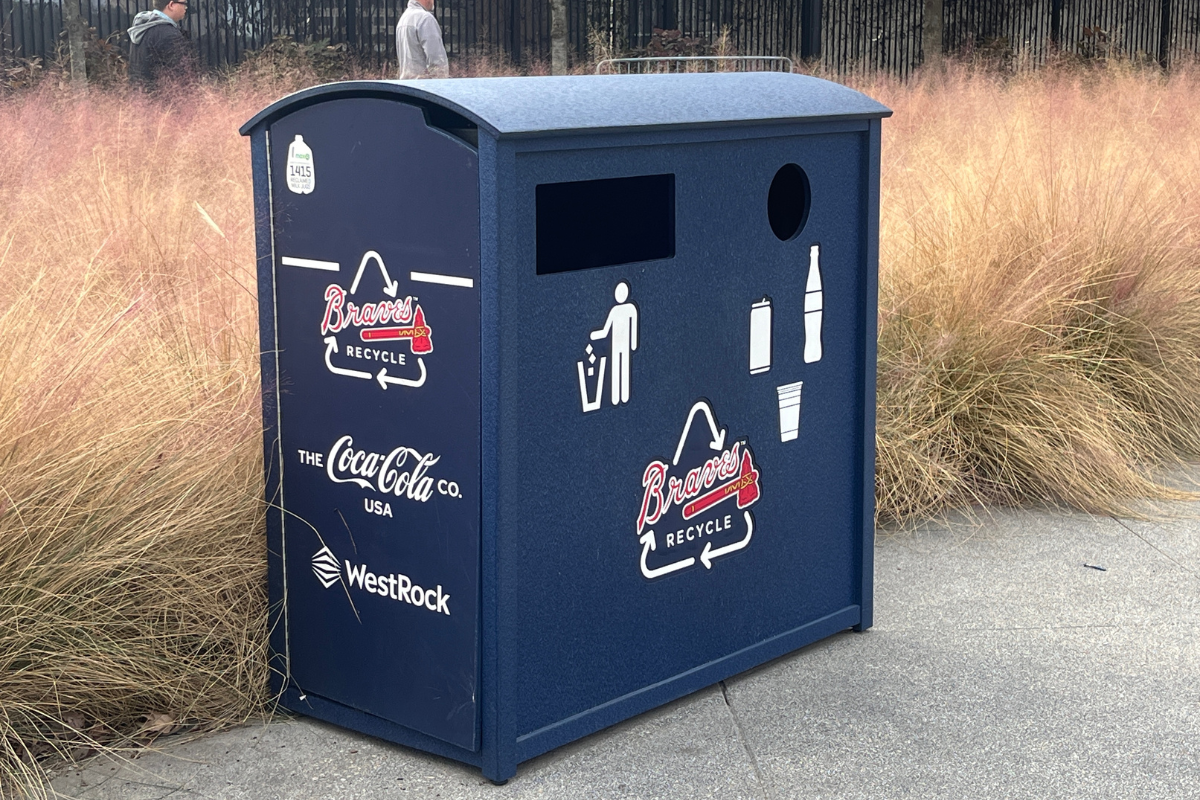
The recycling program in Atlanta, Georgia, has continued to improve recycling rates, but still lags behind the national recycling rate. | Luisa P Oswalt/Shutterstock
Editor’s Note: Community Spotlight was a feature that appeared in the monthly Resource Recycling print edition for several years until mid-2020. This week, we are reviving it as a periodic feature in the Resource Recycling e-news. Have an idea for a municipal program that should be featured? Email us at news@resource-recycling.com.
The recycling program in Atlanta, Georgia, is a work in progress that has seen significant successes, including doubling its recycling rate over a five-year period.
Since 2017, the city’s Department of Public Works has committed to improving its rate of municipal recycling, including creating community programs in collaboration with The Recycling Partnership. These efforts have increased diversion from a base level of 11% to 23% in 2022.
However, recycling rates still fall short of the EPA’s national average of 32% in 2018. Additionally, over 20% of Atlanta’s collected recycling is contaminated, suggesting a lack of education in recycling rules among local residents.
The shortcomings of Atlanta’s recycling programs and efforts to improve it are outlined in a recently released report by the Atlanta City Auditor’s office. The report also includes solutions to make the programs more effective, including setting better goals, conducting feasibility studies, and improving enforcement of local recycling ordinances.
The report concludes with the Department of Public Works’ response to each of the recommendations. The department recognized the problems outlined by the report and agreed to pursue the proposed solutions.
“We are exploring partnerships with community organizations and leveraging existing citywide events to broaden our reach and build community trust,” Deputy Commissioner Kanika Greenlee and Director Kim Rankins wrote on behalf of the department. “This effort is part of our broader commitment to environmental stewardship and improving the effectiveness of our recycling program.”
Problems in program participation
Atlanta’s recycling program collected nearly 20,000 tons of recycling in 2023 and services more than 100,000 residences, according to the Office of Solid Waste Services website. The city contracts with Pratt Industries for sorting, processing and selling its single-stream recyclables and uses the Rubicon digital tool to track collection routes and total tonnage collected.
There are significant differences in how many residents participate in recycling collection between the city’s collection districts, the report notes. The two service areas with the greatest overall waste tonnage on average saw 21% and 25% participation. The other three districts had 16% collection or less.
“This highlights a clear discrepancy in recycling effectiveness that suggests further attention,“ the report notes. “Improving recycling participation in the service areas with lower recycling rates would increase diversion and bring the city as a whole closer to or beyond the national rate.”
In 2007, the city passed an ordinance requiring multi-family homes to participate in recycling programs. However, the report found that there has been little effort to enforce this rule. Neither the Department of Public Works nor the Mayor’s Sustainability Office has tracked the recycling practices of multi-family homes, and the portal for multi-family homes to report their recycling is not checked regularly.
In the report, the Department of Public Works recognized the need for greater enforcement of this ordinance, but also noted that such enforcement would require greater funding and staffing.
Community outreach
The city has collaborated with The Recycling Partnership (TRP) to improve public knowledge about recycling and the local collection program. TRP works to inform Atlanta residents with educational mailers and social media posts, as well as through an app called ReCollect, which notifies users of collection delays and outreach programs.
In 2019, TRP launched Feet on the Street, a program in which collectors would put stickers on recycling carts contaminated with non-recyclables or bagged recycling. The stickers listed recycling rules and better waste disposal practices. According to the report, the program has led to an 80% decrease in bagged recycling and a 30% decrease in non-recyclables appearing in collection.
Moving forward
The audit suggests the city conduct an economic feasibility study on its single-stream recycling program, especially in its glass collection. According to the report, most neighboring municipalities do not collect glass, as it is more expensive to process in single-stream. A feasibility study could identify whether those resources could be best used elsewhere. In the years since efforts to improve Atlanta’s recycling program escalated in 2017, major glass container manufacturer O-I closed its Atlanta facility, likely decreasing the demand for recycled glass in the region.
The report also notes holes in collection infrastructure. In 2024, the city was overpaying Pratt for recycling processing due to errors in the collection data entered into Rubicon. The report suggests the city implement a system that more accurately records tonnage collected and use that data to create reasonable goals for increasing recycling rates.
While the report recognizes the successes in public education through programs with TRP, it also recommends the city develop its own recycling education campaign. Social media posts from TRP focused largely on upcoming collection events run by the organization, whereas an independent education campaign could focus on educating the public about Atlanta’s specific recycling rules and encourage recycling participation.